Did you know pickpockets in Taiwan nowadays are so well-organized that they don't have to worry about serving doing time after being busted by the police? Local TV station SETN (
According to the same TV report, the man behind the scenes is most likely the pickpockets' mentor, the man who trained them and sent them out to the street to ply their trade. His disciples are obliged to give their mentor a certain percentage of their daily take in much the same way as businessmen buy insurance in preparation for a rainy day. And, in accordance with their training, they tend to keep to preassigned routes at familiar locations that attract large crowds, such as popular temples, markets and the entrances of MRT stations
Crowds gathered to watch stars perform on open-air stages on the bustling streets of Hsimenting (
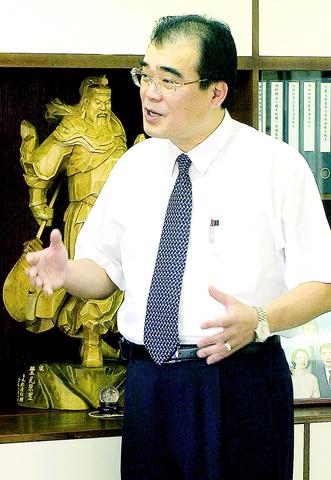
PHOTO: SEAN CHAO, TAIPEI TIMES
Foreign affairs
A report from the Taipei Municipal Police Department (
Much more shocking to the police was the fact that a notebook, which contained the names and addresses of major Taipei department stores and night markets in both Vietnamese and Chinese, was also discovered in one of their bags. Although the Tran Thi sisters refused to disclose the name of their local contact, officers realized that this was their first solid evidence of a new kind of international pickpocket ring that involved the joint efforts of foreign thieves and local organizers.
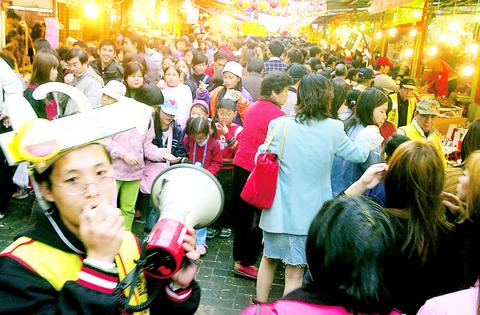
PHOTO: SEAN CHAO, TAIPEI TIMES
As officer Frank Chiu (
A few months latter, another Vietnamese woman named Vu Thi Chun was arrested after she used a sharp knife to cut open a Filipino nurse's handbag at Shihlin night market (
Wen Shyu-fu (
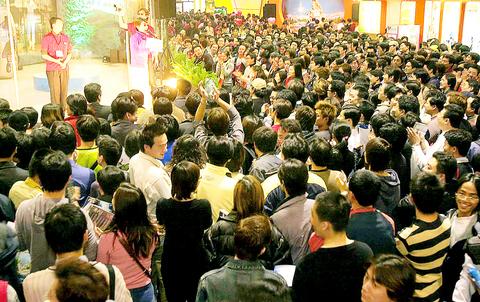
PHOTO: SEAN CHAO, TAIPEI TIMES
Vu, according to Wen, was obviously a rookie and was not well-prepared to notice the presence of police officers in disguise.
Officer Tong Ming-hui (
Still, Vu was smart enough to send all of her cash and jewelry back to Vietnam from Taipei as soon as she was detained at the police station. Apparently, someone else had come to her aid. On the day of her deportation, she even asked the accompanying police officers for taxi money, which she claimed she needed in order to return home safely from the airport in Vietnam.
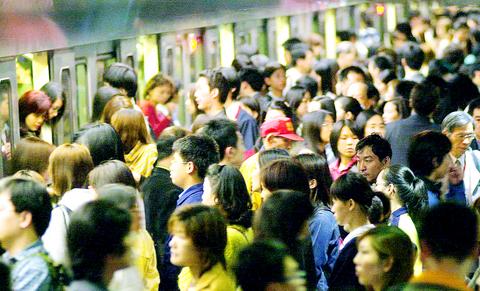
PHOTO: SEAN CHAO, TAIPEI TIMES
Another rare case involved a 65-year-old hardened criminal named Yang Mei-chu (楊美珠). Local police have taken Yang, who is Taiwanese, into custody more than 20 times on suspicion of theft and other criminal offences in the past. She was apprehended again in January after snatching a Malaysian tourist's wallet on Tihua Street during the Lunar New Year period. Stolen goods such as passports, ID cards, drivers' licenses, ATM cards, credit cards and foreign currency such as US dollars, Singapore dollars, Nicaragua cordobas and Malaysian dollars were all found among her belongings.
Targeting temples
In fact, any site with that attracts large crowds also attracts pickpockets. A master at Hsingtien Temple (
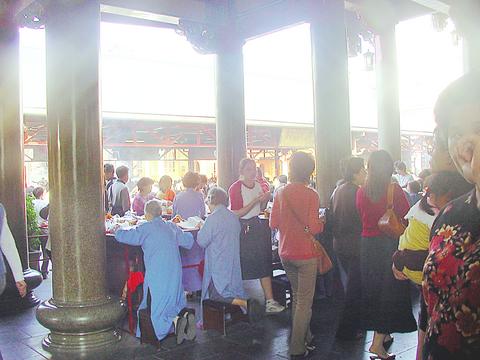
PHOTO: DEREK LEE, TAIPEI TIMES
Purse-snatchers also temples, such as Lungshan Temple (
Officers Wen, Tong and others believe that most of the pickpockets in Taipei operate alone. In contrast, purse-snatchers from outside of Taipei tend to work in teams of three to four, each one assigned a different role in operations which often involve elaborate ruses used to distract potential victims.
In one such ruse, one team member shouts loudly at a crying child in a large store such as Carrefour or RT-Mart to attract the attention of a crowd with wallets full of cash.
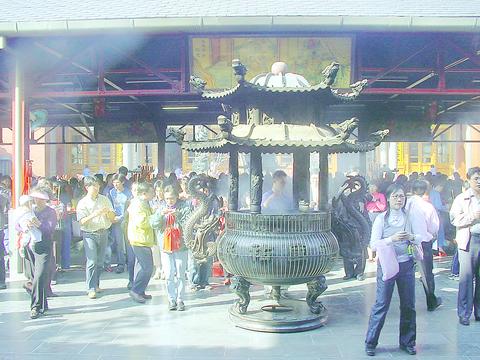
PHOTO: DEREK LEE, TAIPEI TIMES
Similarly, if you try to get on a bus and are blocked by a person who all of a sudden cuts into line in front of you to speak to the bus driver, don't get upset just yet. Your first move should be to reach for your wallet and hold on to it. Otherwise, it may end up in someone else's hands seconds and be gone without a trace.

As Taiwan’s second most populous city, Taichung looms large in the electoral map. Taiwanese political commentators describe it — along with neighboring Changhua County — as Taiwan’s “swing states” (搖擺州), which is a curious direct borrowing from American election terminology. In the early post-Martial Law era, Taichung was referred to as a “desert of democracy” because while the Democratic Progressive Party (DPP) was winning elections in the north and south, Taichung remained staunchly loyal to the Chinese Nationalist Party (KMT). That changed over time, but in both Changhua and Taichung, the DPP still suffers from a “one-term curse,” with the

William Liu (劉家君) moved to Kaohsiung from Nantou to live with his boyfriend Reg Hong (洪嘉佑). “In Nantou, people do not support gay rights at all and never even talk about it. Living here made me optimistic and made me realize how much I can express myself,” Liu tells the Taipei Times. Hong and his friend Cony Hsieh (謝昀希) are both active in several LGBT groups and organizations in Kaohsiung. They were among the people behind the city’s 16th Pride event in November last year, which gathered over 35,000 people. Along with others, they clearly see Kaohsiung as the nexus of LGBT rights.

Jan. 26 to Feb. 1 Nearly 90 years after it was last recorded, the Basay language was taught in a classroom for the first time in September last year. Over the following three months, students learned its sounds along with the customs and folktales of the Ketagalan people, who once spoke it across northern Taiwan. Although each Ketagalan settlement had its own language, Basay functioned as a common trade language. By the late 19th century, it had largely fallen out of daily use as speakers shifted to Hoklo (commonly known as Taiwanese), surviving only in fragments remembered by the elderly. In

Dissident artist Ai Weiwei’s (艾未未) famous return to the People’s Republic of China (PRC) has been overshadowed by the astonishing news of the latest arrests of senior military figures for “corruption,” but it is an interesting piece of news in its own right, though more for what Ai does not understand than for what he does. Ai simply lacks the reflective understanding that the loneliness and isolation he imagines are “European” are simply the joys of life as an expat. That goes both ways: “I love Taiwan!” say many still wet-behind-the-ears expats here, not realizing what they love is being an